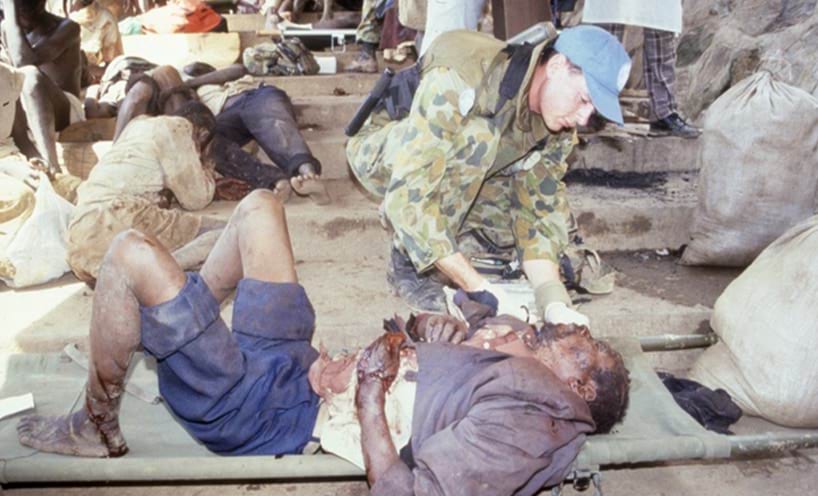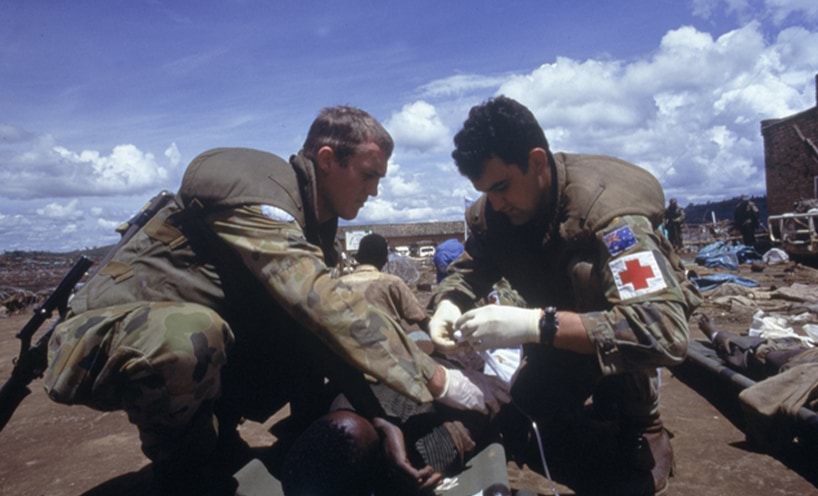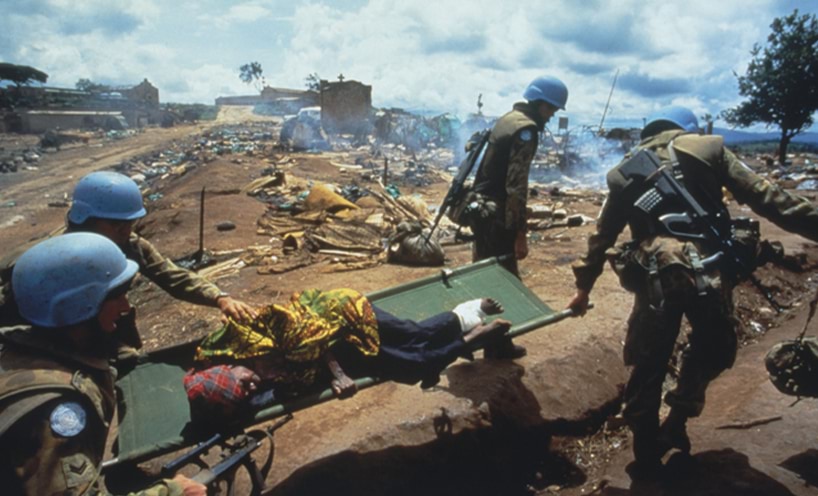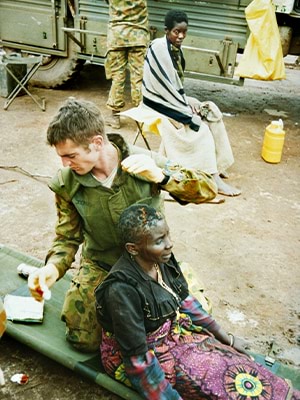- Conflict:
- Rwanda (1994)
- Services:
- Army, Peacekeeping operations
When I was a child in Rhodesia, terrorists surrounded us. We were trapped—captive to bullets and mortars. I had been millimetres away from death. It was in that moment of rescue—when soldiers in Land Rovers raced in—that my world exploded. I was only 10 but I had escaped with my life because others were prepared to sacrifice theirs. From that time I knew that I would be a military doctor. I had to look after these brave men and women, to bring relief to those that needed it. I could never have imagined the journey, the impact upon my life and others...
My parents moved from South Africa to Australia when I was 15. A chance recruitment drive saw me sign up for Military Service at the same time that I studied medicine. I have been honoured to work as both a Commissioned Officer and medical specialist for close to 30 years. During times of relative peace I work in a public hospital. When needed by the Australian Defence Force (ADF), I work in a variety of capacities that deal with medical trauma and rescue.
In 1995 at the age of 27, in the then gleaming role of a Captain in the Army, I was assigned my first overseas mission. To say that I was anxious and excited was an understatement. I wanted to do a great job and to help. At the time of leaving Australia I could not begin to understand the enormity of what lay ahead. The Australian forces had had very little exposure to overseas missions. Our last major encounter was Vietnam. I had just finished my medical degree and had been in the forces for only three years.
Going to Rwanda was like coming home. I grew up in Africa. The sights and sounds that surrounded me were comforting and familiar. My childhood had prepared me for the cacophony. I excitedly went about my duties daily, enthused to provide aid where I could.
On 22 April 1995, I was providing medical aid at an Independent Displaced Persons (IDP) camp at Kibeho. I had been assigned to set up the aid camp. The conditions and oppression were appalling. The energies in the air could only be described as ominous. Tensions had been mounting for days. All of a sudden the refugees started to run. With that, the government forces unleashed such violence and horror that thousands were left dead, dying or maimed by means that were deplorable and inhumane. We were in the middle of it all. With my small team of medics and infantry as protection we worked tirelessly. It was this day as the killing broke out that I committed my team and myself to a lifetime of change.
I could not have asked for more from such a selfless group of men. We were surrounded by horrors that speak of depravity, hate and greed. With very few supplies and no military or medical support, my soldiers and I worked tirelessly to determine to whom we could make a difference. I know these conditions changed all of us. The years that followed would tell how much. My heart and my soul have broken many times over in the passing years for these brave men who worked alongside me.
We made a difference to many, but it seemed not enough. Often we would come across people to whom we had given aid, mercilessly murdered, lying discarded on the sides of the road or in the fields. The one glimmer of hope amongst the thousands of dead, injured and affected refugees was smuggling a little child out. It was that one small act that bound us together in a positive light. Personally, I spent years thinking I was never enough to the thousands of victims.
So how has medicine progressed in the military? Many things have changed. The political world in which we live has now known much involvement in aid and, more recently, terrorism. We have been involved in long campaigns, not in jungles like Vietnam. Instead we have worked in snow, in deserts, on islands and in cities. Each environment requires a specific medical force. We no longer work in the adverse conditions portrayed in MASH. Our facilities and access to worldwide first class clinicians for our soldiers is an incredible advance. To work in a multinational force brings with it the opportunity to exchange clinical expertise. We work in a global organisation committed to providing the best outcomes for our men and women and animals who serve.
I have personally worked with setting up our own Australian aircraft, which work as transport hospitals. No longer does it take weeks for a patient to return home. We can swoop in and pick up our most affected soldiers from military installations throughout most campaign areas.
Medical practice is bound to change. This is how we progress. The one thing that I know for sure is that it is not about the medical advances—but how we apply them to people. Every advance gives more hope and that is a given. Often what is left out of the conversation is the dignity and respect with which we treat people.
To me, the key to recovery is in the humanity of the treatment. As health care professionals we are all well qualified and well-practiced in our trade. The difference that can be given to someone with life changing injuries or who facing death, through the simple act of being present, is priceless. Our patients are not just numbers or conditions, nor are they just comrades-in-arms or adversaries. They are humans and members of a family—all with backgrounds and pressures you can’t begin to know.
I have watched my colleagues sit for hours with patients in their time of need. I have witnessed nurses care for the bodies of our dead men and women and know that even in death the families can know that they are not alone, that they are given every dignity possible. I have talked quietly with unconscious patients, willing them to hold on until their loved ones can be with them. I have sat and patted the hands or forehead of the dying letting them know that there is nothing else to be done and that they can pass in peace.
I know from my experiences and those of my colleagues that the most peaceful and the most successful outcomes come from connecting with patients on a human level.
I held your hand, I touched your face. I listened to you, your fears, your happiness, your fond memories. I even shared your tears. you can rest safely in my care whilst you are here. I will celebrate quietly in my heart your victories as you recover or I will grieve silently as you pass. Regardless—I will be with you and you have touched my soul.
Author:
With almost 30 years of Military and Medical experience, Alexandra Douglas (née Carol Vaughan-Evans) is Australia’s only woman to be awarded the Medal for Gallantry. She has gone on to become a specialist in Intensive Care and Anaesthesia.
Updated



